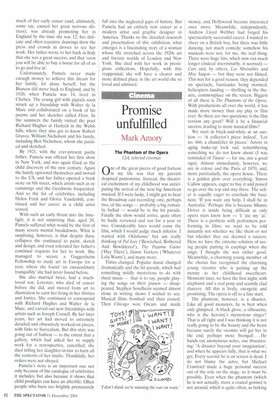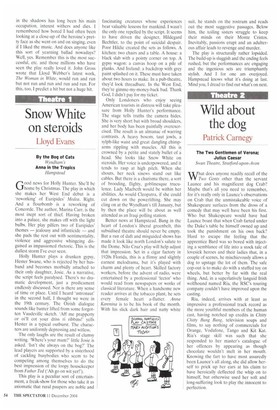Promise unfulfilled
Mark Amory
The Phantom of the Opera I2A, selected cinemas
One of the great pieces of good fortune in my life was that my parents despised pantomime. Instead, the theatrical excitement of my childhood was anticipating the arrival of the next big American musical. If I were lucky, I might get to hear the Broadway cast recording; one, perhaps two, of the songs — probably a big romantic ballad — would be in the hit parade. Finally the show would arrive, quite often be badly reviewed and run for a year or two. Considerably later would come the film, which I would judge much inferior. I started with Oklahoma! but am really thinking of Pal Joey (Bewitched, Bothered And Bewildered'), The Pajama Game (`Hey There'), Damn Yankees (Whatever Lola Wants'), and many more.
Times changed. Popular music changed dramatically and the hit parade, which had something mildly mysterious to do with sheet music — that is to say, people playing the songs on their pianos — disappeared. Stephen Sondheim seemed almost alone in writing shows I wished to see. Musical films bombed and then ceased. Then Chicago won Oscars and made ral s 1. # '-',--S?"*.ssqmo m y/.......
.--,.. 1
&IFTS! 1 ‘14 I■i-TV ,r4 mogE. 1 1,4 Ahn. ! money, and Hollywood became interested once more. Meanwhile, independently, Andrew Lloyd Webber had forged his spectacularly successful career. I wanted to cheer on a British boy, but there was little dancing, not much comedy; somehow his musicals were not, for me, the real thing. There were huge hits, which now ran much longer (indeed interminably, it seemed) — Cats and, by others, Les Miserables and Miss Saigon — but they were not filmed. This was for a good reason: they depended on spectacle, barricades being stormed, helicopters landing — thrilling in the theatre, commonplace on the screen. Biggest of all these is The Phantom of the Opera. With productions all over the world, it has made more money than any play or film ever. So there are two questions: is the film version any good? Will it be a financial success, leading to more musical films?
We start in black-and-white at an auction — 'A collector's piece indeed', 'Lot no. 666, a chandelier in pieces.' Actors in aging make-up look sad, remembering something we do not know about (I was reminded of Titanic — for me, not a good sign). Almost immediately, however, we are in colour and the Paris of 1870, and, more particularly, the opera house. There is a golden glow over everything. Simon Callow appears, eager to buy it and poised to go over the top and stay there. The seller is equally eager to conclude the business: 'If you want any help, I shall be in Australia.' Perhaps this is because Minnie Driver is inside being difficult as only opera stars know how — 'I 'ate my 'at.' There is a problem with performers performing in films; we want to be told instantly not whether we like them or not but whether they are deemed a success. Here we have the extreme solution of seeing people putting in earplugs when she sings; I thought she was rather good. Meanwhile, a charming young member of the chorus has recognised the charming young vicomte who is putting up the money as her childhood sweetheart. Moments later, we have the first night, with elephants and a real pony and scantily clad dancers. All this is lively, energetic and promising. The opera is off to a fine start.
The phantom, however, is a disaster. Like all good monsters, he is best when only glimpsed. A black glove, a silhouette, who is the heroine's mysterious singer? That is all right and I was thinking it is not really going to be the beauty and the beast because surely the vicomtc will get her in the end; perhaps more Svengali ... He hands out anonymous notes, one threatening: 'A disaster beyond your imagination', and when he appears fully, that is what we get. Every second he is on screen is dead. I do not blame the actor, but Michael Crawford made a huge personal success out of the role on the stage, so it must be possible. Even when the phantom (which he is not actually, more a crazed genius) is not around, which is quite often, as lurking in the shadows has long been his main occupation, interest withers and dies. I remembered how bored I had often been looking at a close-up of the heroine's pretty face as she went on and on singing, even if I liked the music. And does anyone like this sort of yearning ballad nowadays? Well, yes. Remember this is the most successful, etc. and those millions who have seen the play really loved it. John Gross wrote that Lloyd Webber's latest work, The Woman in White, would run and run but not run and run and run and run. For this, too, I predict a hit but not a huge hit.











































































 Previous page
Previous page